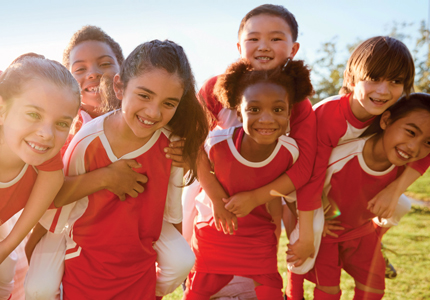Primary Times - the definitive what’s on and where to go family guide of activities and events for children of primary school age. Things to do with your kids during the school holidays including arts and craft activities, music and theatre for children, parties, competitions, days out, and family attractions along with term time drama schools, dance classes, after school clubs and sports activities. Things to do at a place near you!
The importance of sports for children
 According to the NHS, children should aim to be physically active for at least 60 minutes a day, with 30 minutes of this being outside of school times. Regular exercise is crucial for primary school children to not only improve and maintain their physical health, but also for their mental and social wellbeing. Primary Times takes a look at these three important benefits to an active lifestyle and provides tips on the best places to find out-of-school sports activities.
According to the NHS, children should aim to be physically active for at least 60 minutes a day, with 30 minutes of this being outside of school times. Regular exercise is crucial for primary school children to not only improve and maintain their physical health, but also for their mental and social wellbeing. Primary Times takes a look at these three important benefits to an active lifestyle and provides tips on the best places to find out-of-school sports activities.
Physical Health
Being physically healthy is extremely important for primary school children as their bodies begin to grow and they develop active sporting habits that can carry through to adulthood. According to the Primary Teaching Services (PTS), one in three UK children leave primary school overweigh. Daily exercise through sports activities will burn excess calories; keeping weight gain to a minimum and benefitting a child’s bone and muscle strength.
Consistent physical activity also promotes a healthy the heart and lungs, lowers the risks of type 2 diabetes, and keeps blood pressure and cholesterol at a healthy level.
Regular exercise has also been shown to help children gain a better night sleep, which in turn helps children to concentrate during school lessons.
Mental Wellbeing
As online learning, social media and video games become more popular with younger generations, primary school children are at risk of spending many hours of the day sat down, in front of a screen. Not only does this negatively impact a child’s physical health, it can also be a negative influence their mental wellbeing. Taking a break from screens to participate in a sport activity has been known to lower levels of stress and anxiety in children. It also gives children a chance to take a break from schoolwork, where they can get some fresh air and connect with the outside world. This can create a positive attitude towards sports and exercise, which can carry through to adulthood.
Social Activities
Sport activities are a brilliant way of socialising and making new friends outside of the classroom environment.
Most sports, such as football or netball, require teamwork and teambuilding skills, which can help a child to feel connected within a group and build upon their own social confidence.
Where to go?
There are many places that cater to children’s sports and general exercise. Try checking out what your local leisure centre or after school clubs have to offer. Sport classes are usually so much fun that your child might not even realise they are getting any exercise at all, and regular attendance will build confidence and friendships too.
You can also look to our What’s On Where guide in your issue of Primary Times to find fun sport activities and clubs such as Everyone Active and Better leisure centres in your local area.




